
Introduction
In a nation as diverse as Belgium, where linguistic, regional, and cultural identities intersect, understanding the political inclinations of its student population becomes vital. By delving into the political beliefs and ideologies of Belgian students, we gain valuable insights into how these diverse backgrounds influence their views on governance, policy, and societal issues.
Through a comprehensive survey involving 281 Belgian students, we discovered the beliefs, ideologies, and voting behaviors shaping the political ideals of students.
Here's what we discovered:
The “Belgian” Identity
We explored the complexity of national identity among Belgian students, aiming to uncover how young Belgians define themselves.
Students were prompted to select the identity that resonated most with them, choosing from options such as 'Belgian,' 'Flemish,' 'Walloon,' 'European,' or 'Other’
Among French-speaking respondents, the majority identified primarily as Belgian (65.2%), with smaller proportions choosing European (17.4%) , Walloon (15.9%) and Other (1.4%).
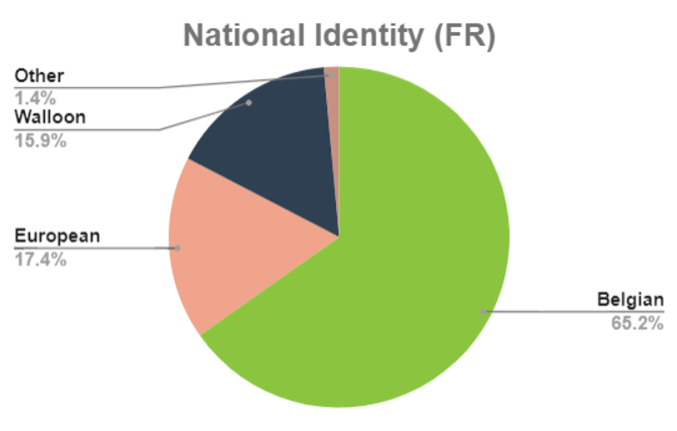
Note: National Identity of Belgian French-speakers
In contrast, Dutch-speaking respondents predominantly identified as Flemish (50.9%), over Belgian (41.6%). European (5.6%) and Other (1.9%) identities garnered the lowest support.
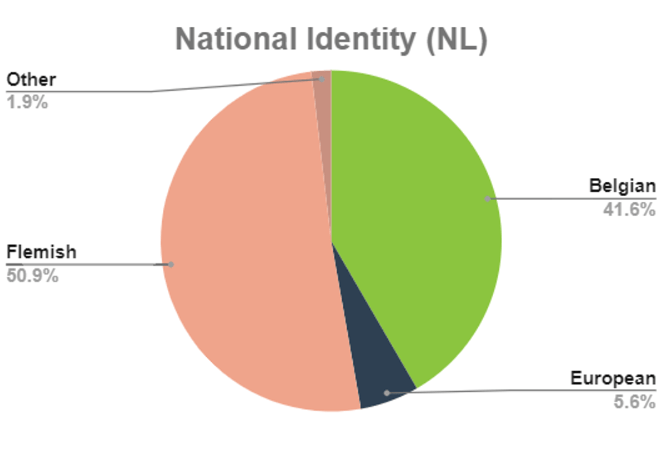
Note: National Identity of Belgian Dutch-speakers
Ideologies & Voting Patterns
In addition, we further questioned students’ on their political leanings and past voting patterns.
Among French-speaking participants, Socialism emerged as the most popular ideology, with 34% of respondents leaning towards it, followed by Liberalism at 22%. Conservatism, Communism, and Nationalism also garnered support, with 16%, 13%, and 9% of respondents, respectively. Additionally, 3% of French-speaking participants did not align with any specific ideology.
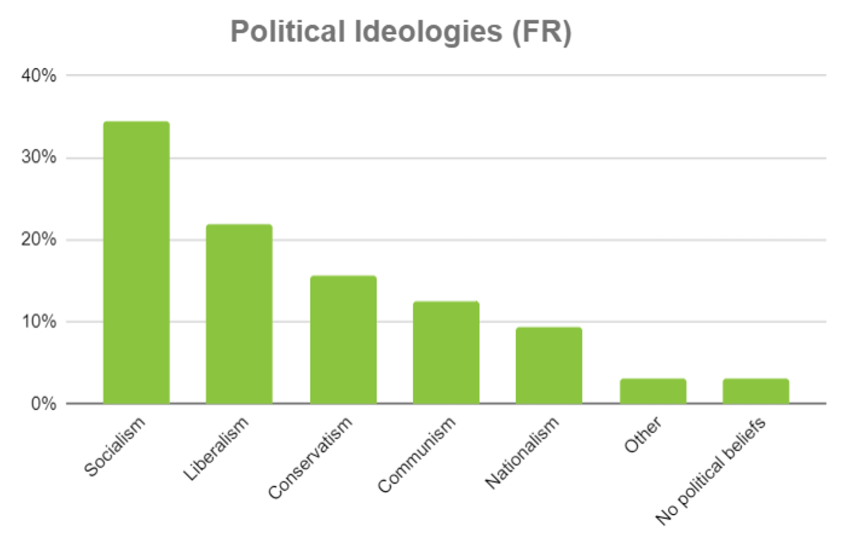
Note: Political Ideologies of Belgian French-speakers
Similarly, among Dutch-speaking participants, Socialism retained its dominance, capturing 32% of the ideological spectrum. Liberalism followed closely at 20%, while Nationalism, Communism, and Conservatism garnered 15%, 10%, and 8% of the preferences, respectively. Additionally, a notable 10% of Dutch-speaking respondents indicated a lack of commitment to any specific political ideology.
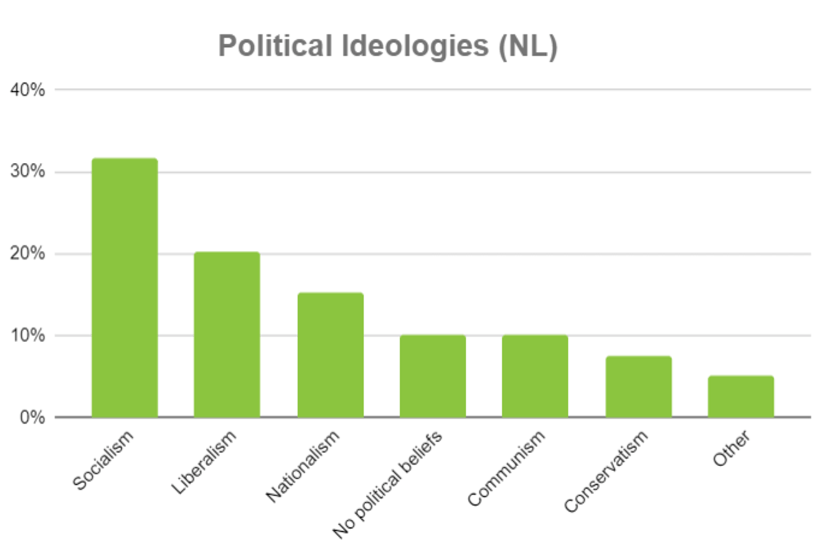
Note: Political Ideologies of Belgian Dutch-speakers
When asked about their voting choices in past elections, French-speaking student respondents primarily voted for Parti Socialiste (PS) and Ecolo, with each receiving 29% of the support. The Reformist Movement (MR) followed with 19% of respondents indicating their voting preference for this party. Additionally, a portion of respondents expressed their backing for Parti du Travail de Belgique (PTB) at 10%, while Les Engagés and Démocrate Fédéraliste Indépendant (Défi) each received 6% of the votes.
Comparing the data on political opinions of french-speaking students to the data unveiled following the Belgian federal elections in 2019 we can conclude that students who voted in the past elections followed the tendencies of the general walloon region. Notably, the largest support both among students (29%) and in the general Walloon region (25.4%) was for PS. Furthermore, French-speaking students supported Ecolo equally as PS (29%), while the general Walloon region voted for Ecolo at a lower rate (16.5%). MR emerged as the next popular choice for both the student base (19%) and the general Walloon region (20.3%). Similarly, PTB garnered support from both students (10%) and the general Walloon region (13.8%). Lastly, the numbers for Les Engagés and Démocrate Fédéraliste Indépendant (Défi) were comparable for both groups.
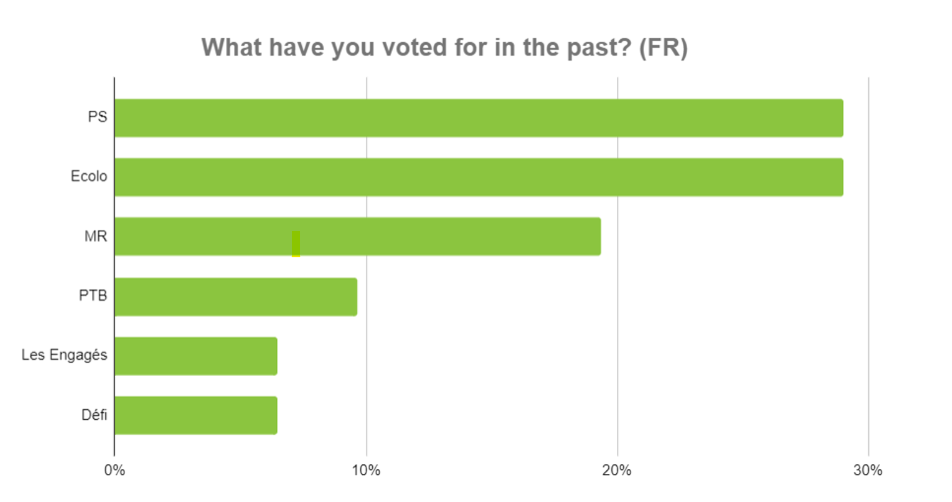
Note: Past voting choices of Belgian French-speakers
In contrast, Dutch-speaking respondents predominantly voted for The New Flemish Alliance (N-VA) (29%) and Groen (22%), while Open Vld and CD&V received 18% and 7% of their votes, respectively. Additionally, 5% of respondents chose Vlaams Belang and Vooruit. PVDA, PS, and MR were each selected by 2% of Dutch-speaking respondents. Moreover, 5% of respondents preferred not to disclose their past preferences, while 2% submitted blank votes in previous elections.
Comparing the political opinions of Dutch-speaking students to the data unveiled after the Belgian federal elections in 2019 reveals that students' voting patterns in the past did not always align with the tendencies of the general Flemish region. While the largest support in the student base (29%) was for N-VA, mirroring the top choice in the Flemish region (25.6%), other preferences diverged. Groen, for instance, was the second most supported party among students, whereas it ranked significantly lower in the general Flemish region at only 9.7%. Conversely, while Vlaams Belang was the second most favored party in the Flemish region (19.05%), it received considerably less support from students, with only 5% voting for it. Additionally, Open Vld and CD&V received varying levels of support from Dutch-speaking students (18% and 7%, respectively), compared to the votes they received from the general Flemish region (13.62% and 14.17%, respectively). Finally, while 2% of Dutch-speaking students supported PVDA, a slightly higher percentage of the general Flemish region (5.6%) voted for the same party.
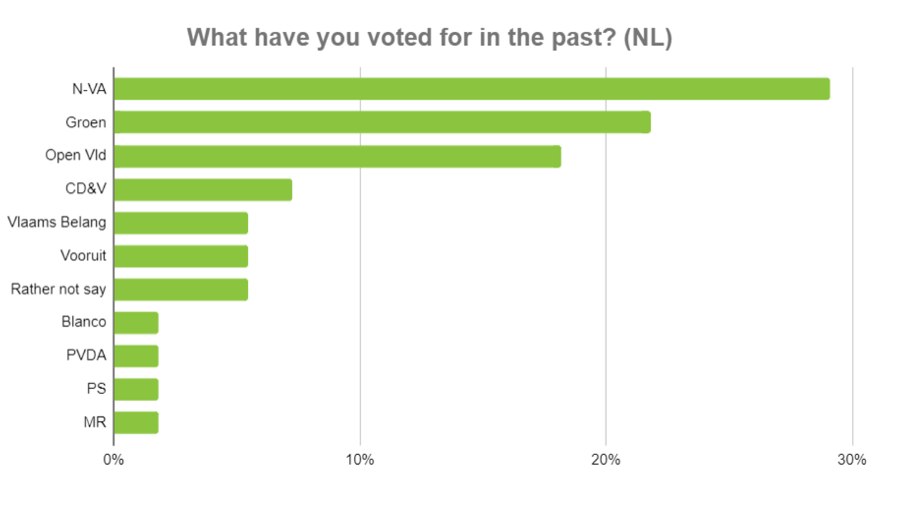
Note: Past voting choices of Belgian Dutch-speakers
Upcoming Elections
In examining voting intentions, respondents were asked about their plans for the upcoming elections. The findings revealed that 89% of respondents intended to participate in the upcoming selections, while 11% stated they would not.
Those indicating their intention to vote were then queried about their voting preferences for 2024.
Among French-speaking respondents, Ecolo emerged as the top choice (25%), followed by MR (17%). An equal proportion of respondents remained undecided about their voting choices (17%), followed by PS (16%). PTB, Les Engages, and Defi each garnered 8% of the votes, while Vlaams Belang, CD&V, and N-VA received 2% each.
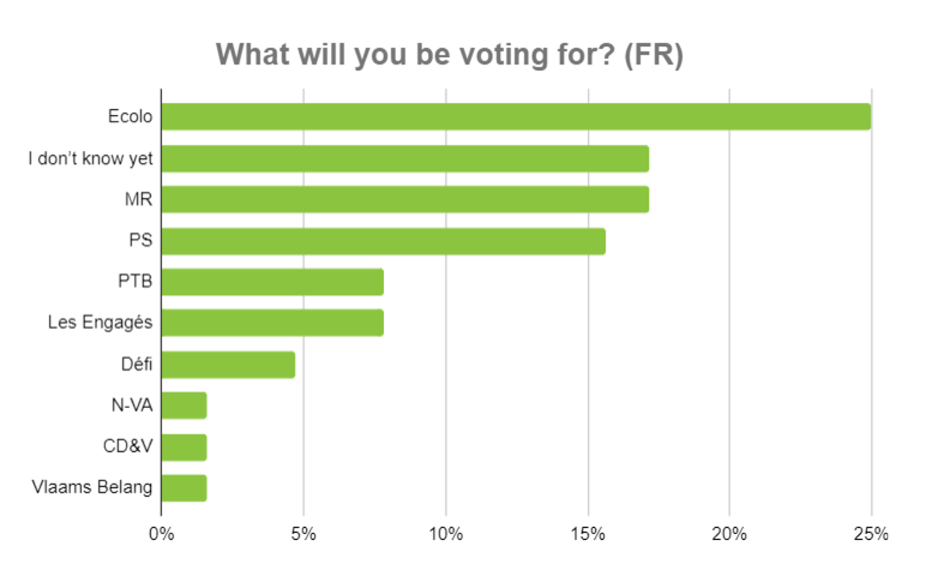
Note: 2024 Voting choices of Belgian French-speakers
For Dutch-speaking respondents, the highest number remained undecided about their voting choices (26%). Following this, the New Flemish Alliance (N-VA) emerged as the preferred party (16%), closely followed by Groen (14%), PVDA (11%), Open Vld (11%), and CD&V (9%). Vlaams Belang and Vooruit both followed with 5% of voting preference. Finally, Les Engages and Ecolo were the least favored, garnering 1% of the votes.
Comparing the political opinions of Dutch-speaking students to the most recent polling of political opinions in the general Flemish region conducted by multinational market research company Ipsos reveals that student votes do not always mirror the general tendencies of the region (Lebrun, 2022). While N-VA emerged as the top choice for students (16%), the most right-winged parties, Vlaams Belang and N-VA, garnered the most support in the regional polling. However, Vlaams Belang received only 5% of student votes. Additionally, students supported Groen (14%) as the second most favored political party, whereas in the general polling, Groen received 7.8% of the regional votes.
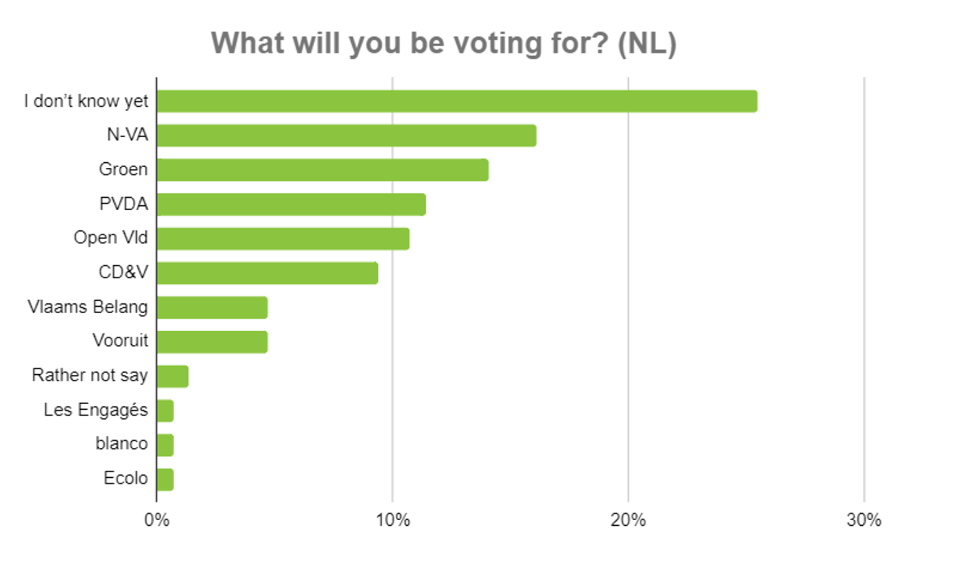
Note: 2024 Voting choices of Belgian Dutch-speakers
Political Engagement and Research
When it comes to staying informed about political news, social media has emerged as a dominant source of political content (21.1%), however it is closely followed by traditional outlets like newspapers (19.2%) and television (17.5%).
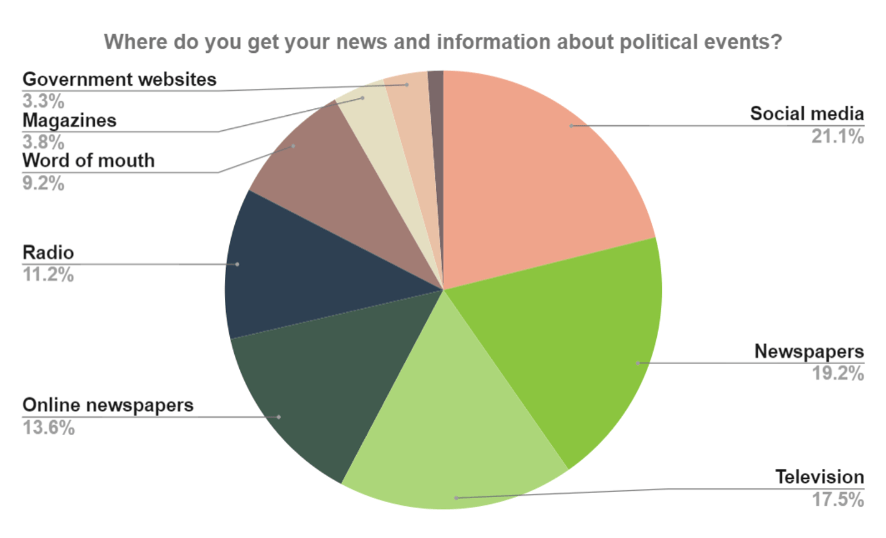
Note: Students' media preference for political research
Furthermore, in terms of conducting political research for the upcoming elections, approximately 41% of students reported actively engaging in research.
Beliefs
We delved into the different opinions of Belgian students on a range of pivotal topics, including social, defense, economic, immigration, climate, and political trust views. Students were presented with various statements and asked to indicate their level of agreement or disagreement with each statement.
Social Views
Students were invited to share their perspectives on a range of social issues. The statements covered topics such as LGBTQ+ rights, equal rights regardless of race or ethnicity, traditional religious values, abortion rights, and access to healthcare. Each respondent indicated their level of agreement with these statements.
Statement 1: "Access to universal and affordable healthcare is a fundamental right." Approximately 78% of French-speaking students agreed with this sentiment, while 85% of Dutch-speaking students shared this belief. In contrast, 6% of French-speaking students and 5% of Dutch-speaking students disagreed.
Statement 2: "I believe in the right to abortion." Regarding this statement, 71% of French-speaking students and 79% of Dutch-speaking students expressed support for this right. Conversely, 7% of both French-speaking and Dutch-speaking students did not support this statement.
Statement 3: "A lot needs to be done to ensure equal rights for all Belgians regardless of their racial or ethnic backgrounds." Among French-speaking students, 71% indicated support for this statement, while 66% of Dutch-speaking students agreed. On the other hand, 4% of French-speaking students and 12% of Dutch-speaking students disagreed.
Statement 4: "I believe that social services should support everyone." When it came to the role of social services, 57% of French-speaking students and 70% of Dutch-speaking students agreed that social services should support everyone. However, 15% of French-speaking students and 12% of Dutch-speaking students disagreed.
Statement 5: "Protecting LGBTQ+ rights is important." 65% of French-speaking students and 63% of Dutch-speaking students agreed with the importance of protecting LGBTQ+ rights. Nonetheless, 10% of French-speaking students and 16% of Dutch-speaking students disagreed.
Statement 6: "I do everything I can to protect traditional religious values." In contrast, opinions on protecting traditional religious values were more divided. Among French-speaking students, 39% believed in the importance of protecting these values, while only 25% of Dutch-speaking students shared this sentiment. However, 33% of French-speaking students and 40% of Dutch-speaking students disagreed.
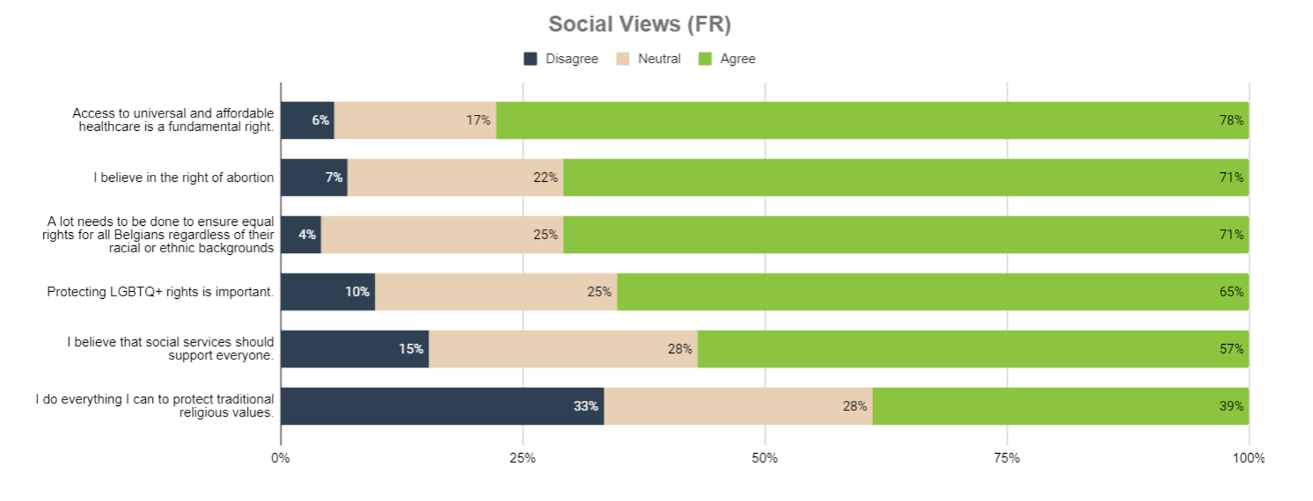
Note: French-speaking students' social views
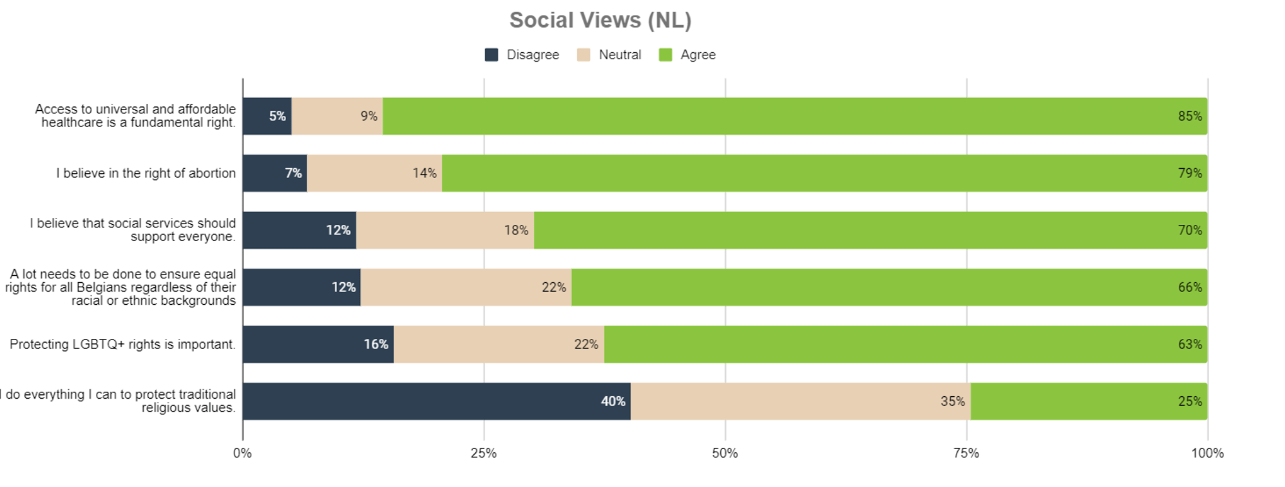
Note: Dutch-speaking students' social views
Defense & Protection Views
Exploring respondents' attitudes towards defense and protection, we gain insights into their views on military funding, police protection, and international law.
Statement 1: "It is more important to fund public education than the military." Among French-speaking respondents, 56% agreed with prioritizing funding for public education over the military, while 14% disagreed. Among Dutch-speaking students, 59% supported prioritizing public education, with 8% expressing disagreement.
Statement 2: "We need more police protection." When asked about the need for increased police protection, 56% of French-speaking respondents expressed agreement, while 15% did not see the necessity. Among Dutch-speaking students, 59% supported the need for more police protection, with 15% expressing dissent.
Statement 3: "Military action that defies international law is sometimes justified." Regarding military actions potentially defying international law, 26% of French-speaking students supported the justification of such actions, while 39% disagreed. Among Dutch-speaking respondents, 28% agreed with the justification of international law violations, while 30% expressed disagreement.
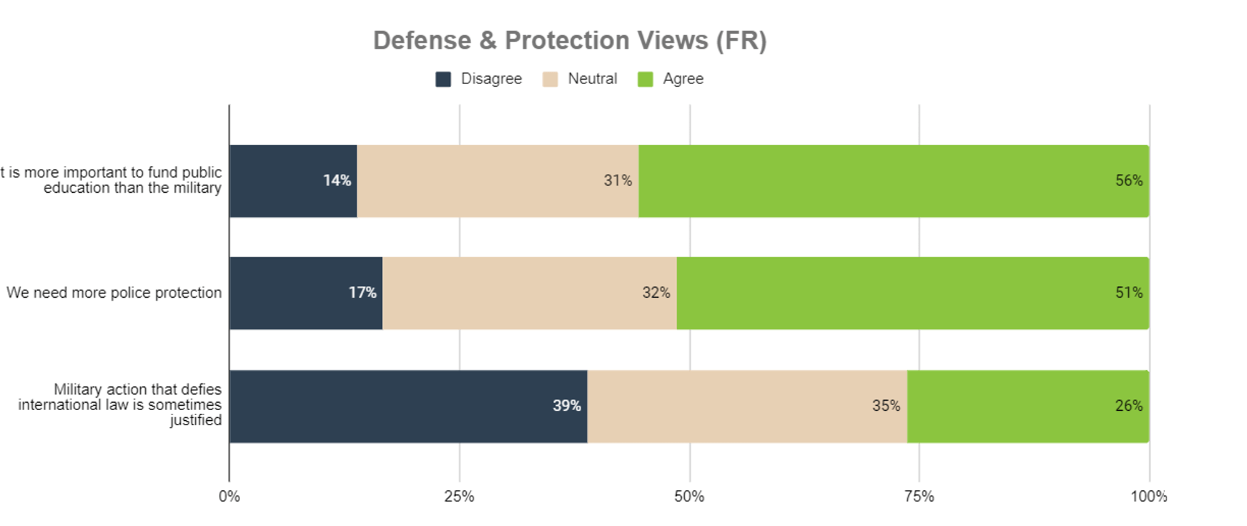
Note: French-speaking students' defense and protection views
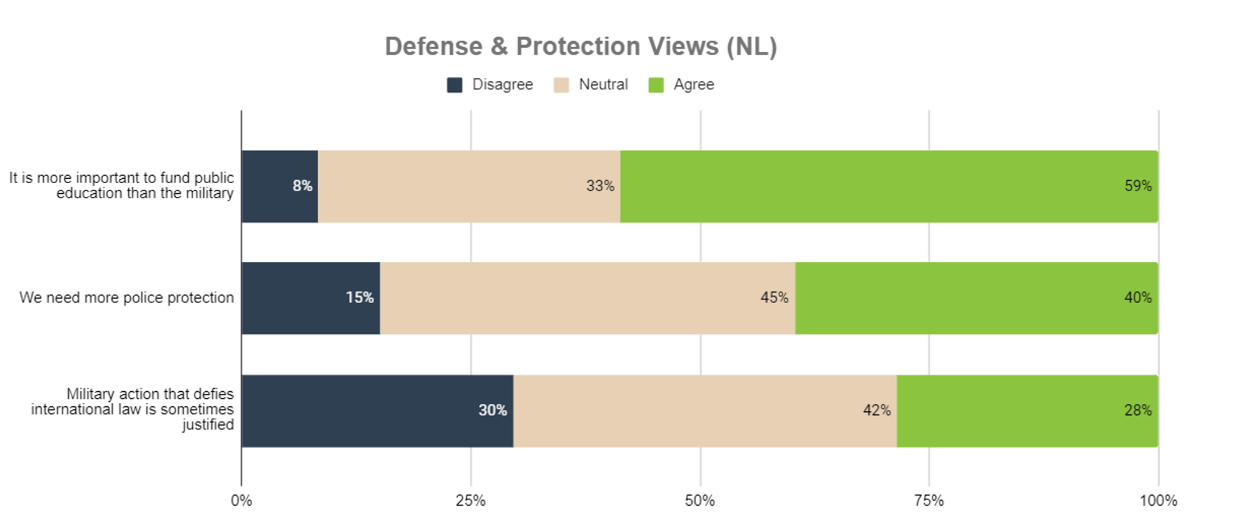
Note: Dutch-speaking students' defense and protection views
Economic Issues
When it comes to opinions on economic issues and priorities. Our latest survey offers a revealing glimpse into the economic beliefs held by Belgian students, covering a spectrum of crucial issues including economic disparity, government responsibility, business regulation, and priorities in wealth maximization.
Statement 1: "Government should strongly regulate business to protect workers and consumers."
When it comes to governmental intervention in business regulation, the majority of French-speaking students (65%) advocate for strong regulation to protect workers and consumers, with only 11% dissenting. For Dutch-speaking students 47% supports stronger regulation, while 21% oppose it.
Statement 2: "It is the responsibility of the government to reduce income differences among people."
In terms of government responsibility for reducing income differences, over half (60%) of French-speaking students align with this sentiment, contrasting with 14% who disagree. Among Dutch-speaking students, less than half (44%) agree, while 21% express disagreement.
Statement 3: "An important reason for economic disparity is because the economy is unfair."
Regarding the perceived reasons for economic disparity, a notable 60% of French-speaking students attribute it to the unfairness of the economy, while only 8% disagree. Conversely, among Dutch-speaking students, less than half (38%) agree with this notion, with 15% dissenting.
Statement 4: "Maximizing business wealth should be our country's top priority."
When considering the top economic priority for the country, opinions vary. While 31% of French-speaking respondents prioritize business wealth maximization, 19% disagree. In contrast, 21% of Dutch-speaking students agree, while a larger proportion (36%) express disagreement.

Note: French-speaking students' economic issues views
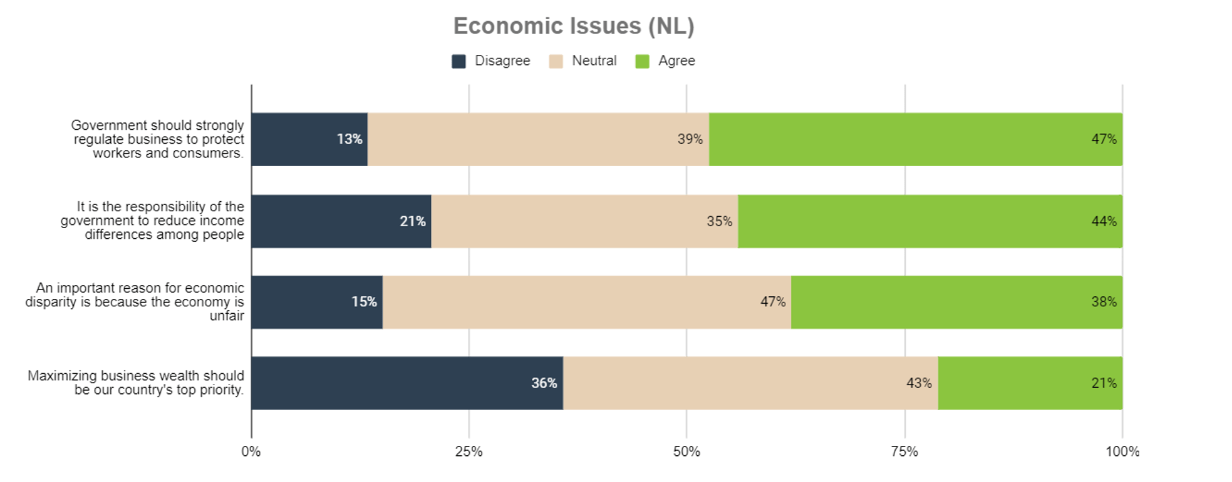
Note: Dutch-speaking students' economic issues views
Immigration Views
When it comes to immigration concerns our recent survey offers a glimpse into the diverse viewpoints held by Belgian students, covering a wide array of topics such as national pride, immigrant integration, national identity, and pathways to citizenship. Let's delve into the key findings:
Statement 1: "There should be a way for undocumented immigrants already in Belgium to become citizens."
When it comes to pathways to citizenship for undocumented immigrants, 46% of French-speaking respondents support establishing such pathways, while 17% do not. Among Dutch-speaking respondents, 36% agree, with 27% expressing disagreement.
Statement 2: "Belgium’s openness to immigrants is positive to who we are as a nation."
Regarding Belgium's openness to immigrants and its impact on national identity, 46% of French-speaking students belief openness to immigrants is postitive for the nation, while 22% oppose it. Among Dutch-speaking students, 30% both agree and disagree regarding Belgium’s openness to foreigners is positive to the nation. The rest of the Dutch-speaking students indictated to be neutral.
Statement 3: "First-generation immigrants can never be fully integrated within a new country."
Opinions on the integration of first-generation immigrants vary, with 25% of French-speaking respondents agreeing that full integration is impossible, while 46% disagree. Among Dutch-speaking students, 22% agree with the statement, while 55% disagree.
Statement 4: "No one chooses their country of birth, therefore it is not logical to be proud of it."
Regarding national pride and its relation to birthplace, approximately 25% of French-speaking students agree that one's country of birth doesn't justify pride, while 40% disagree. Among Dutch-speaking students, 21% agree, while 44% disagree.
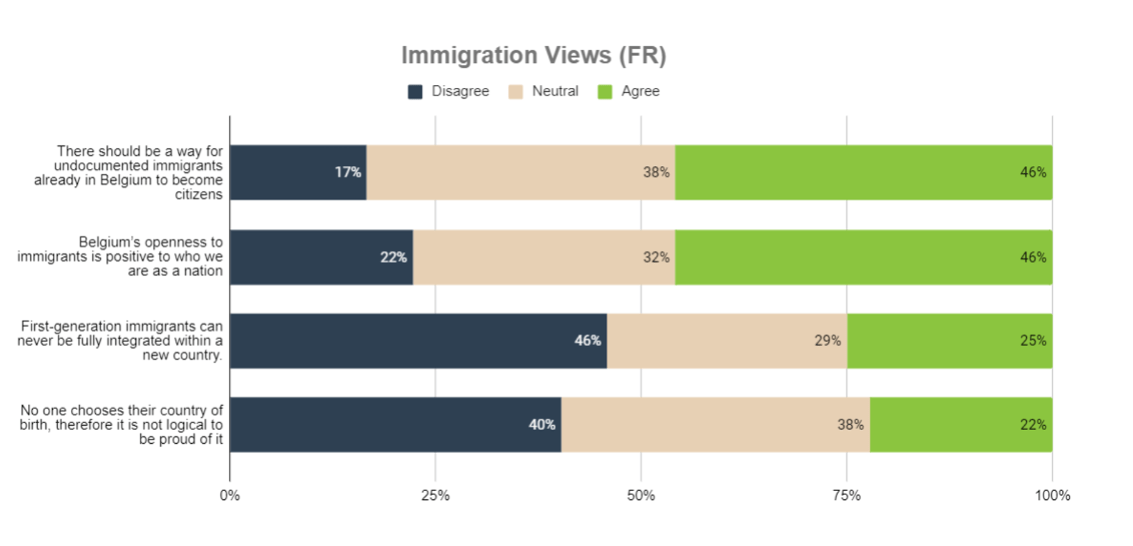
Note: French-speaking students' immigration views
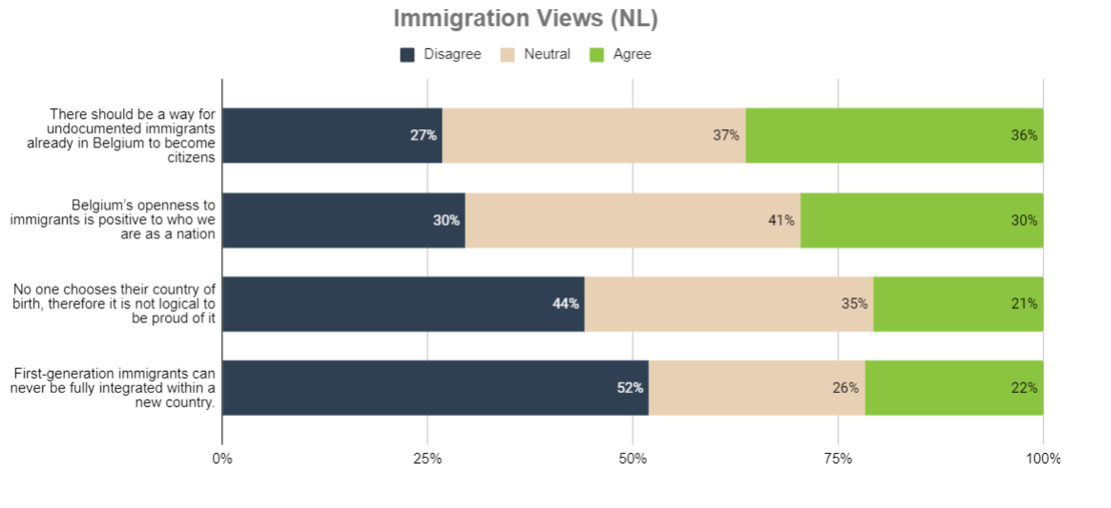
Note: Dutch-speaking students' immigration views
Climate Concerns
The survey delves into the perspectives of Belgian students on climate issues, particularly focusing on the prioritization of climate change by the government.
Statement: "Climate change is an important concern our government should prioritize."
A majority of both French-speaking and Dutch-speaking respondents voiced their support towards prioritising climate change by the government as an important concern. Among French speakers, 69% endorse prioritizing climate change, with only 8% dissenting. Similarly, 66% of Dutch speakers advocate for the government to prioritize climate change, with an equal 8% holding opposing views.
These findings underscore the widespread recognition among Belgian students of the urgent need for government action on climate change.

Note: French-speaking students' climate concerns

Note: Dutch-speaking students' climate concerns
Political Trust
In the examination of political trust among Belgian students, we've uncovered intriguing insights into their attitudes towards politicians.
Statement: "I trust our politicians."
When it comes to trust in politicians, a 9% of French-speaking students expressed trust, with a majority (58%) indicating distrust. On the other hand, 11% of Dutch-speaking respondents expressed trust in politicians, with 64% expressing distrust.
These results align with broader sentiments reflected in findings by The Brussels Times, which highlighted widespread distrust and dissatisfaction amongst Belgians when it comes to politics. The article noted that Wallonia residents were less likely to associate positive sentiments with politics, with only 5% expressing trust or respect for the political system, compared to 8% in Flanders and 11% in Brussels. In contrast to our survey results, the article further revealed that residents of Wallonia, particularly, exhibited the highest levels of negativity towards Belgian politics, with 66% expressing distrust or disgust, compared to 57% in Flanders and 55% in Brussels (Moller-Nielsen, 2023).
These findings highlight a prevalent skepticism towards politicians among Belgian students, with trust levels notably low across both linguistic groups.

Note: French-speaking students' political trust

Note: Dutch-speaking students' immigration views
Coalition-Building Dynamics
In the domain of potential political alliances, our survey reveals contrasting attitudes among Belgian students towards collaboration with Vlaams Belang and PTB/PVDA.
When asked about collaborating with Vlaams Belang, 36.2% of French-speaking respondents expressed support, while a significant majority, 63.8%, opposed such collaboration. Conversely, among Dutch-speaking respondents, 50% supported collaboration with Vlaams Belang, while an equal 50% opposed it.
In contrast, opinions regarding collaboration with PTB/PVDA differed. Among French-speaking respondents, 58% favored working with PTB/PVDA, while 42% disagreed. Among Dutch-speaking respondents, 65% supported collaboration with PTB/PVDA, while 35% expressed opposition.
These findings shed light on the complexities of coalition-building dynamics, highlighting divergent attitudes towards different political parties among Belgian students.
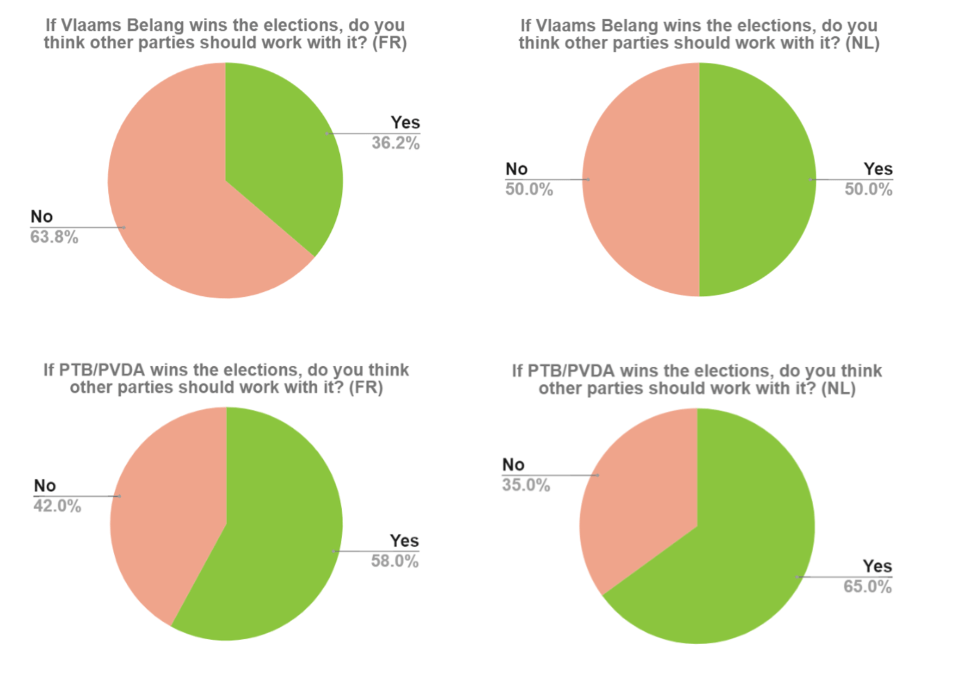
Unveiling Belgian Student Politics
Our survey sheds light on the varied beliefs and ideologies shaping the political inclinations of Belgian students. Covering voting behaviors, social, economic, immigration and environmental perspectives, these findings offer crucial insights into the diverse viewpoints guiding political discussions among the youth in Belgium. These insights not only capture current attitudes but also provide a groundwork for anticipating future trends in political engagement and activism among the younger population. By exploring student opinions on a spectrum of issues, we gain a deeper understanding of the influences driving political decision-making and potential pathways for societal transformation.
Sources
Lebrun, J.-M. (2022, March). Le Grand Baromètre. Gent; Ipsos.
Moller-Nielsen, T. (2023, April 3). Large majority of Belgians do not trust country’s politicians, poll finds. The Brussels Times. https://www.brusselstimes.com/440230/large-majority-of-belgians-do-not-trust-countrys-politicians-poll-finds

